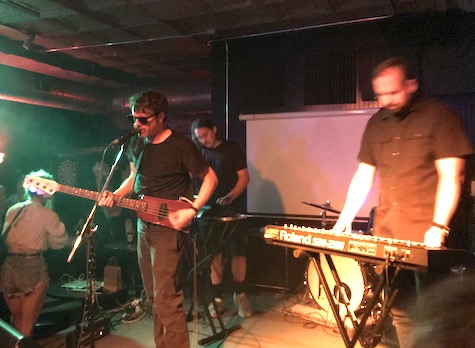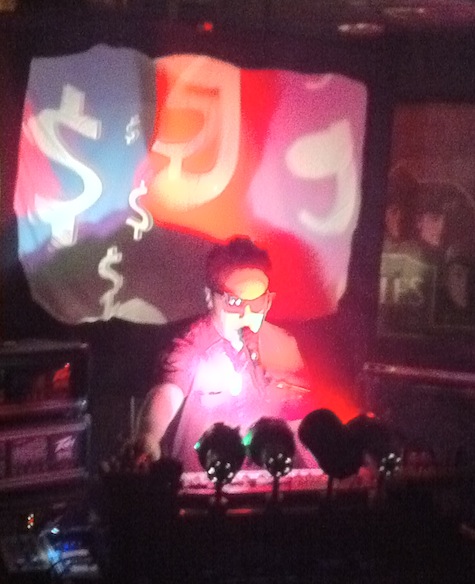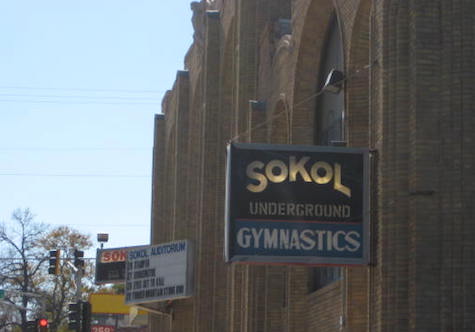Column 95 — The stench of rock… – Oct. 5, 2006
Just when you thought you’d heard all you care to about Omaha’s new pseudo-smoking ban that went into effect Sunday, here’s another comment, this time from the musicians’ perspective. What wasn’t pointed out in the column below was the scorecard as to where smoking is and isn’t allowed. Smoking isn’t allowed at Sokol Underground, Sokol Auditorium and Mick’s — that’s the extent of the ban’s impact. It’s still allowed for the next five years at O’Leaver’s, The 49’r and The Saddle Creek Bar. If you don’t know the rules, here’s an abbreviated explanation: Smoking is allowed in bars that don’t serve food (O’Leaver’s, The 49’r) and isn’t allowed in multi-use facilities (Sokol) or bars that serve food unless those bars offer keno (The Saddle Creek Bar). Mick’s, which doesn’t have a kitchen, voluntarily banned smoking.
Column 95: The Smell of Rock
Is smoking part of rock ‘n’ roll?
Before we move forward, we must understand and agree on this one conceit: Smoking holds no value in a human being’s life. None. It is not essential for your continued existence. In fact, it’s unquestionably destructive. It shaves the very essence of life away from the individuals that imbibe in its behavior.
Anyone who smokes cigarettes knows this, and has known it from the first puff. Just like those who drink bottle after bottle of beer and/or wine know that their lives are in no way being enhanced by the activity. There is no argument for drinking alcohol, especially when the endeavor taken to excess results in inebriation, loss of reasonable judgment and motor skills, and a painful hangover. Anyone who drinks knows this, and has known it from their first under-age beer.
To say that second-hand smoke is more dangerous than the secondhand effects of a drunk smashing into your car is to ignore the fact that more people are killed driving than by almost any other activity, and that a huge number of those deaths are the result of drunken driving.
That said, smoking and drinking are a part of rock and roll right along with sex and drugs. Always have been. Always will be? Who knows, but probably, in some form or another, regardless of any awkwardly developed citywide ban that says it’s okay to smoke in some bars but not in others.
Part of the experience of going to rock shows for as long as I can remember has been going home afterward and stripping off my tar and nicotine-soaked clothing so as not to contaminate the sheets before passing out, then picking up my t-shirt in the morning and smelling the previous night’s stench. Now that’s rock and roll. And it’s going to become a thing of the past, eventually.
No one knows this more than the people who make a living performing in the smoke dens, but even among them, there is no agreement that the smoking ban is good or necessary.
Take Matt Whipkey, lead singer/guitarist of Anonymous American (Who, by the way, will be releasing a new album by the end of the year). Whipkey’s down with the smoking ban. “In terms of my personal dexterity, you smell better after you get done,” he said of playing gigs in smoke-free bars. “When playing out of state or at smoke-free places like The Zoo Bar (in Lincoln), I’m not absolutely disgusting afterward.”
Whipkey says the smoking ban might even bring more people to gigs, people who have avoided going to shows because they can’t stand the smoke. “Times are changing,” he said. “You can’t do it in Minneapolis, Lawrence, New York, Madison, California or Lincoln. I assume you can’t do it in most cities. It’s just how it goes.”
And then there’s Dave Goldberg, guitarist/keyboardist/drummer/vocalist of The Terminals (Who, by the way, have a new record coming out on Cleveland’s Dead Beat Records). “It’s like taking the smut out of Time’s Square,” he said of the ban. “I’m against it. Rock and roll is supposed to be bad for you. Smoking has been a part of it since its inception. And this is coming from a non-smoker.”
Forget about the sanitized confines of a smoke-free lounge. A punk from back in the day, Goldberg prefers the grime. “I’m partial to a seedy atmosphere, and smoking is definitely part of it,” he said. “I’ve gone to blues clubs for years now, and it seems to go hand-in-hand. Smoky rock clubs — it’s almost like that’s how it should be.”
Unlike Whipkey, Goldberg thinks the ban will have a negative impact on audiences. “In Lincoln, you noticed the effects immediately,” he said of the Capitol City’s ban, which has been around for almost a year. “Duffy’s, for example, has a beer garden, and a lot of times a band will be playing to a partially full or worse-sized audience on account of everyone being outside smoking.”
The one thing Whipkey and Goldberg do agree on: Playing in smoky bars has never impacted their performance quality, or so they think. “Part of my vocal style is the accumulation of secondhand smoke caked on my lungs over the years,” Whipkey said. “Maybe now I’ll sound like a choir boy.” Let’s hope not.
Goldberg, who just finished touring the country as drummer for theater-rock legend Thor, has played in both smoke and smoke-free environments. “I’ve never noticed a difference,” he said, “but I spent a lot of time in smoky bars, perhaps I’m used to it.”
So who’s right? Smoking is indefensible. Banning it in clubs like Sokol Underground will only save lives and keep my clothes and hair smelling better after a night of noise. But you know what? I’m still going to miss it. — Lazy-i, Oct. 5, 2006
Yeah, well, guess what, I don’t.
Back to the future….
Tonight at Reverb, LA’s Vinyl Williams headlines with Oquoa and Chemicals. $7, 9 p.m.




Recent Comments